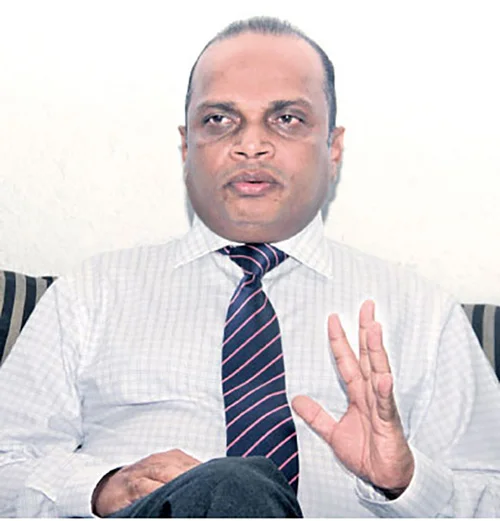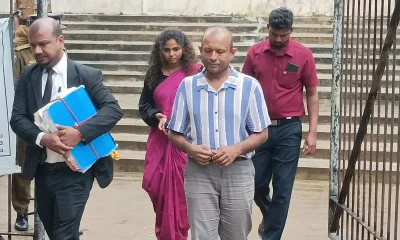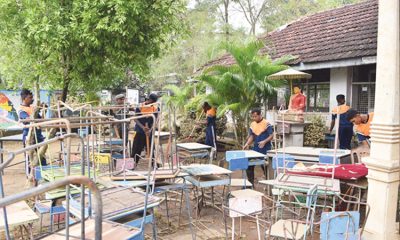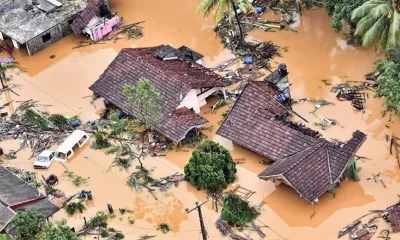Business
CICT crowned Best Container Terminal for its capacity in Asia for 7th consecutive year

Beats terminals in China, Indonesia and Thailand to win coveted AFLAS award in Under 4 million TEUs category
Colombo International Container Terminals (CICT) has been declared the Best Container Terminal in Asia in 2023 in the Under 4 million TEUs category, winning the coveted title for the seventh consecutive year.
CICT’s impressive triumph on the global stage was announced by Asia Cargo News at the 2023 Asian Freight, Logistics and Supply Chain (AFLAS) awards gala at JW Marriott Singapore South Beach Hotel. CICT CEO Mr Jack Huang accepted the award on behalf of the Company.
The three other shortlisted finalists in the running for the prestigious award were Fuzhou International Container Terminal – China, Jakarta International Container Terminal – Indonesia and Laem Chabang International Terminal – Thailand.
Commenting on this remarkable achievement, CICT CEO Jack Huang said: “This award is most significant because it is not just about volumes. The winners are selected by the votes of the people that matter the most – freight and logistics companies and clients from around Asia and the Pacific who have business internationally. The award recognises demonstrated leadership, consistency in service quality, innovation and reliability. CICT is therefore greatly honoured to have won the AFLAS award for the 7th year in succession. I am very proud of the team I am working with.”
“CICT has actively embraced technological innovation, promoted digitalization, emphasized talent development, continuously optimized operational efficiency, and improved customer satisfaction,” Huang added. “This award will inspire CICT to further expand and enhance terminal management, streamline operational processes, and raise service levels to create greater value for our customers.”
CICT handles more than half of Sri Lanka’s import and export trade volume. Located at a strategic point on the Maritime Silk Road, CICT is near the international shipping routes from the Far East to Europe, and offers a well-developed logistics system. CICT currently serves 30 shipping routes and serves as a hub for numerous shipping companies on the Far East to Europe routes.
The CICT terminal has a quay length of 1,200 meters, covers 58 hectares of land, and is equipped with 14 advanced quay cranes, 46 fully electric rubber-tired gantry cranes, and offers a water depth of 18 meters at the quay, making it the only deep-water container terminal in operation in South Asia, capable of handling the largest container vessels in the world. CICT also features Sri Lanka’s first and the most advanced hazardous goods storage yard, with an annual capacity of handling 50,000 TEUs of hazardous cargo.
CICT officially commenced operations in 2014, with a throughput of 680,000 TEUs in its first year. By 2022, the throughput had reached 3.18 million TEUs, achieving a compound annual growth rate of 18.7% over nine years and contributing to the rise in global rankings of the Port of Colombo from 34th place in 2012 to 23rd place in 2022.
Currently, CICT maintains a stable quay crane operating efficiency of 33 moves per hour, leading the South Asian region. As of September 2023, the average vessel turnaround time has been reduced by 1.3 hours compared to the same period in 2022.
Business
Birthday gift turned lifeline: US-based young environmentalist steps up for Sri Lanka

For Daham Perera, a December birthday celebration this year became something far more meaningful than cake, candles or gatherings with friends. Instead, it turned into a deeply personal act of solidarity with a country he calls his motherland.
Perera, a young environmental enthusiast based in Los Angeles, says his bond with Sri Lanka remains unbroken despite living thousands of miles away. “Although I live in America, my parents and all my relatives live in beautiful Sri Lanka. That connection is something I carry with me every day, he said.
Having visited Sri Lanka in August, Perera spent weeks traveling across the island, reconnecting with relatives and visiting historical and environmentally significant sites. “I saw the true beauty of Sri Lanka – its people, its biodiversity, and its rich heritage. Those memories are among the most beautiful in my life, he recalled.
That joy, however, was short-lived. Soon after his return, the devastating Ditwah cyclone struck the island, leaving a trail of destruction. Homes were damaged, livelihoods disrupted and families displaced. “When I saw images of my friends losing their homes, books soaked in mud, clothes ruined by floodwaters, I felt a pain I cannot put into words, Perera said.
As an environmentalist, the damage to Sri Lanka’s fragile ecosystems troubled him deeply. “Sri Lanka’s biodiversity is priceless. When disasters like this strike, it is not just people who suffer, but forests, wildlife and entire ecosystems that take years to recover, he noted.
With his birthday falling on December 9, Perera made an unconventional decision. “Normally, my father and I celebrate our birthdays by going to the temple and spending time with friends. But this year, celebrating didn’t feel right when my people were suffering, he explained. “I kept asking myself—what can I do, even from afar?”
The answer was simple but powerful. Perera chose to donate all the money he had saved for his birthday celebrations, along with additional contributions from his family, towards relief efforts in Sri Lanka. “Economic support at times like this is critical. Even a small contribution can help a family rebuild, restart a livelihood, or regain dignity, he said.
The donation was formally handed over to Sri Lanka’s Consul General in Los Angeles, Charith Yattegoda, at the Consulate premises. For Perera, the gesture carried deep emotional significance. “If I can replace my personal happiness with smiles on the faces of people back home, that is the most beautiful birthday I could ever celebrate, he reflected.
He describes the letter of appreciation he received in return as his most treasured gift. “That thank-you letter is not just paper. It is a reminder that loving your country means standing by it in its darkest moments. It will always remain one of the most meaningful keepsakes of my life, Perera said.
Perera hopes his story will inspire other young Sri Lankans living overseas to stay connected and give back. “Distance should never weaken our responsibility. Supporting Sri Lanka—its people, its economy, and its environment—is something we can all do, no matter where we live, he added.
In turning a birthday into an act of compassion, Daham Perera has offered a quiet but powerful reminder: sometimes, the greatest gifts are the ones we give away.
By Ifham Nizam
Business
John Keells Foundation partners Sri Lanka Police in combatting violence against women and children

As part of its ongoing commitment to combat violence against women and children towards empowering a healthy and progressive nation, John Keells Foundation (JKF) continues to empower law enforcement agencies through Project WAVE (Working Against Violence through Education) – its flagship of over ten years – to combat gender-based violence and child abuse.
These activities include a strategic collaboration through which JKF supported the Sri Lanka Police to enhance their response to crimes involving women and children through the sponsorship of a global cutting-edge investigative software for use in the Cyber Investigation Unit (CIU) at the Bureau for the Prevention and Investigation of Abuse of Children and Women (BPIACW). The software enables officers to analyse and connect data efficiently, strengthening their ability to investigate and prevent online exploitation and related offences. BPIACW reported that the new platform had directly contributed to a significant and measurable improvement in their investigative capacity, recording the rescue of 22 children, the arrest of 21 suspects, and the filing of 111 cases in courts within the first year of its deployment.
Speaking on the partnership with JKF, Deputy Inspector General of Police – Ratnapura, and Former DIG – Children & Women Abuse Prevention 8 Investigation Range, Renuka Jayasundara said, “We extend our sincere gratitude to JKF for your steadfast partnership and for serving as a cornerstone of our efforts to strengthen child protection services through Project WAVE. Your contribution is making a tangible and quantifiable difference as evidenced by the growing numbers of successful investigations and legal referrals.”
Beyond technological support, JKF has also conducted a series of Train-the-Trainer (ToT) programmes, to improve the ability of officers to respond to GBV and CP in a sensitive and effective manner. The sixth such ToT was conducted from 24th to 26th of September 2025 for the benefit of nominated officers of the Homagama, Kaduwela and Maharagama police divisions. To date, 162 officers across 60 police stations have been impacted.
Business
SLANZBC appreciative of help from Australia and New Zealand

The Sri Lanka Australia–New Zealand Business Council (SLANZBC) has extended its profound gratitude to both the Australian and New Zealand governments for the generous and timely assistance provided to Sri Lanka during the recent flood devastation.
Chandana Amaradasa, SLANZBC president, noted that both governments donated one million dollars each, in their respective currencies, at a critical moment for Sri Lanka — support that will play a significant role in helping communities rebuild their livelihoods.
The government of New Zealand has pledged NZ$1 million to support humanitarian relief efforts in Sri Lanka following Cyclone Ditwah.
This assistance will be channeled through an international
humanitarian partner to strengthen ongoing rescue and relief operations.
Similarly, the Australian government announced on November 30, 2025 that it will provide AUD 1 million in humanitarian aid to bolster Sri Lanka’s response to Cyclone Ditwah.
These compassionate and timely gestures, Amaradasa said, once again demonstrate the unwavering commitment of both countries to stand beside the Sri Lankan people in times of crisis. He also recalled that
Australia and New Zealand have consistently supported Sri Lanka, stepping forward during previous national emergencies as well.
Today’s humanitarian assistance further reaffirms the depth of these longstanding relationships and the true spirit of friendship that binds the nations — a bond built on mutual respect, shared values and enduring goodwill.
“Our association deeply appreciates this kind and meaningful support and remains committed to fostering even closer ties between the people of Sri Lanka, New Zealand, and Australia, he added.
By Hiran H Senewiratne
-

 Features6 days ago
Features6 days agoFinally, Mahinda Yapa sets the record straight
-

 Features6 days ago
Features6 days agoHandunnetti and Colonial Shackles of English in Sri Lanka
-

 Business5 days ago
Business5 days agoCabinet approves establishment of two 50 MW wind power stations in Mullikulum, Mannar region
-

 News5 days ago
News5 days agoGota ordered to give court evidence of life threats
-

 Features5 days ago
Features5 days agoCliff and Hank recreate golden era of ‘The Young Ones’
-

 Opinion6 days ago
Opinion6 days agoA national post-cyclone reflection period?
-

 Features5 days ago
Features5 days agoSri Lanka and Global Climate Emergency: Lessons of Cyclone Ditwah
-

 Latest News6 days ago
Latest News6 days agoSri Lanka squad named for ACC Men’s U19 Asia Cup















